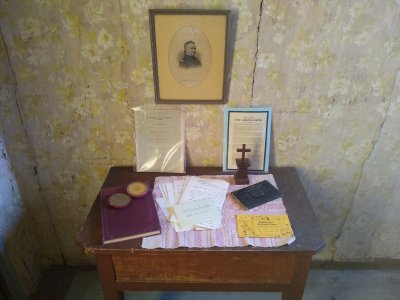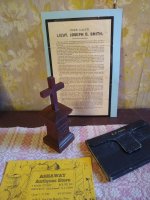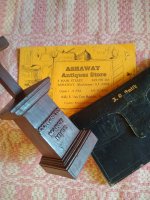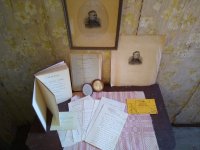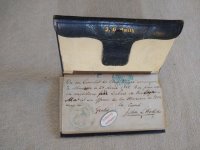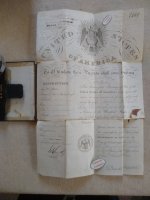Ashaway Antiques
Lt. Joseph B. Smith and U.S.S. Congress Lot Civil War Battle of Hampton Roads
Circa: 1860s to 1870s
$995
Item Details
"Then Joe must be dead!"
Civil War lot related to Lt. Joseph B. Smith of the U.S.S. Congress and Rear Admiral Joseph Smith, circa 1862 to 1876. Lt. Joseph B. Smith was killed in action while commanding the U.S.S. Congress during the Battle of Hampton Roads, His father, Admiral Smith, was in charge of the Bureau of Yards and Docks for the United States Navy in Washington, D.C. When he learned that the flag on the U.S.S. Congress had been taken down during the battle, Admiral Smith was reported to have said “Then Joe must be dead!”
The key pieces in this lot are a memorial sermon for Lt. J.B. Smith, a piece of wood carved like a monument and inscribed Congress—March 1862, and a passport wallet marked J.B. Smith and signed by Daniel Webster. The lot also includes items relating to Adm. Joseph Smith: a carte-de-visite photograph in an oval case, two portrait prints of him in uniform (one framed), and eight letters written by Smith to his nephew from 1867 to 1876.
Born in Belfast, Maine, Joseph Bryant Smith (1826-1862) was appointed a midshipman in the U.S. Navy at the age of fifteen. He graduated from the U.S. Naval Academy in 1847 and served in various postings until 1855, when he was promoted to lieutenant. Smith served aboard the U.S.S. Merrimack from 1857 to 1859, while that ship was flagship for the Pacific Squadron. He was briefly stationed at the Washington Navy Yard before being assigned to the U.S.S. Congress. That ship returned from its station with the Brazil Squadron at the start of the Civil War and was assigned to the Atlantic Blockading Squadron. Most of the crew was stripped from the ship and it was stationed at Newport News in January and February of 1862.
On the morning of March 8, 1862, the U.S.S. Congress was anchored off Newport News when the ironclad C.S.S Virginia steamed out of Norfolk to attack the Union fleet. (Ironically, the vessel was built on top of the remains of the former U.S.S. Merrimack.) The U.S.S. Cumberland and the U.S.S. Congress, under the command of its Executive Officer 1st Lt. Joseph B. Smith, exchanged fire with the Confederate ironclad, with but little effect. The ironclad rammed and sank the Cumberland and then turned its attention to the Congress. Smith had intentionally run it aground, after seeing the ironclad sink the Cumberland. Aided by three smaller Confederate vessels, the Merrimac tore the Congress apart with cannon shot. Smith was killed, and the U.S. flag was hauled down. Knowing that his son would never surrender the vessel, when Rear Admiral Joseph Smith heard that the U.S.S. Congress had struck its colors he reportedly cried out in dismay, “Then Joe must be dead!”
After Joe’s death, Admiral Smith was given the U.S. flag from the Congress and likely his son’s personal effects, including his passport wallet. I suspect the carved wood was made from a piece of the U.S.S. Congress and also presented to Admiral Smith in commemoration of Lt. Smith’s tragic death. The miniature obelisk type monument is about 5 ½” tall and 2 ¾” square at the base. It’s made from a high quality hardwood, has finely carved details, and is topped by a cross. The words and date “Congress—March 1862” are carved in relief. The passport is folded up in a wallet that has the name J.B. Smith in gilt letters on the cover. The passport is signed by Daniel Webster, then Secretary of State, as well as J.B. Smith, and is dated January 15, 1851. Smith was 5’ 8 ¾” tall with grey eyes, auburn hair, an oval face, a narrow mouth, a prominent nose, and a large forehead. The wallet includes also ten pages of stamp marks and information from the countries that Smith visited while overseas on voyages in 1851 and 1857. The small broadside handbill with a black border was probably printed shortly after his death, with text from the obituary published in the Boston Post. Admiral Smith may have had it printed for his son’s memorial service. It gives a brief history of Lt. Smith’s service and death, and ends with a note about Admiral Smith’s service as a lieutenant at the Battle of Lake Champlain in 1814.
Rear Admiral Joseph Smith (1790-1877) entered the U.S. Navy as a midshipman in 1809 and was promoted to lieutenant at the start of the War of 1812. Serving on the U.S.S. Eagle at the Battle of Lake Champlain, Lt. Smith was badly wounded and feared killed. He would remain with the U.S. Navy the rest of his life and served on different ships until 1846, when he was given the position of Chief of the Bureau of Yards and Docks. Rising to the rank of Rear Admiral, Smith held the position through the Civil War and until his retirement in 1869.
This lot includes a Civil War era carte-de-visite photograph of Admiral Smith in an oval velvet case, as well as two printed portraits of him (one framed). There are eight letters sent by Smith to his nephew Joseph S. Bigelow (1848-1930), one on Bureau of Yards and Docks stationary. The content is mostly family related matters. There is also a memorial sermon for Admiral Smith, published in Boston in 1877. The twenty four page pamphlet consists of a front cover and loose unbound pages. It does give a fairly thorough biography of Joseph Smith and talks a bit about his two sons, both of whom died before him. The final item in this lot is a bound genealogy of the Smith Family, published in 1895 and giving the family history of Admiral Smith (with a picture of him).
The general condition of the items in the lot is perhaps good or better. The carved piece has a corner nick at back right at the top of the pediment, an edge nick right at the C in Congress, and a perhaps a couple of fleabites around the bottom. It also appears that the right bar on the cross was broken and glued long ago. The passport wallet is in remarkably good shape and shows only light wear and soiling on the outside, but the passport document itself is in only fair condition with tears at the folds and the bottom section hanging on by just a small piece. The black border memorial was folded and shows wear and a couple of minor tears at the folds. The Admiral Smith items also are in good or better condition overall.
The TNT movie Ironclads revolves largely around Admiral Smith and Joe and is emblematic of the popular appeal of the battle of the Monitor and the Merrimac.
An important Civil War grouping related to an iconic naval battle!
Ashaway Antiques
Kris VanDenBossche
20 High Street
Ashaway, RI, 02804-1406
United States
Cell: 14013778116
.jpg)
More Information
Booth 1
Shipping and Returns
Shipping at cost. Larger items available for pickup or local delivery.Additional Information
No discount on prices on Friday. Fair offers considered on Saturday and Sunday.Cash, check and PayPal preferred for payment.
